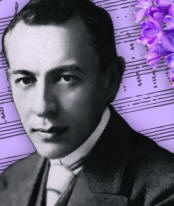 "Spring in New York isn't as special as spring in Russia," observes
Nikolai Kachanov, conductor and artistic director of the Russian Chamber Chorus of New York. "It's much more sudden there.
In my city in Siberia, it always came on the same day, April 14. At about 2:00
PM we would hear the ice on the river crack. The snow would melt and a couple of
days later everything would burst into bloom, all at once. We have to express
that when we sing this piece."
"Spring in New York isn't as special as spring in Russia," observes
Nikolai Kachanov, conductor and artistic director of the Russian Chamber Chorus of New York. "It's much more sudden there.
In my city in Siberia, it always came on the same day, April 14. At about 2:00
PM we would hear the ice on the river crack. The snow would melt and a couple of
days later everything would burst into bloom, all at once. We have to express
that when we sing this piece."
The piece in question, Rachmaninoff's rarely performed 1902 cantata Vesna (Spring) for baritone, chorus and orchestra, is based on a poem by Nikolai Nekrasov which tells the story of a man who has spent the whole winter cooped up inside with his unfaithful wife. Festering resentment and cabin fever lead to murderous thoughts, which are demonically spelled out by the chorus. "Be scary!," Nikolai instructs us during rehearsals as we hum chromatically descending minor thirds that explode into the fortissimo cry "Ubey izmennitsu!"--"Kill the adulteress!"
Yet the arrival of spring changes the husband's mood to one of loving forgiveness. His change of heart seems motivated not by rational thought, but by a deeper, instinctive communion with nature that people can still feel today. Dostoyevsky captured this feeling brilliantly in The Brothers Karamazov: "I love the sticky leaves in spring, the blue sky--that's all it is. It's not a matter of intellect or logic, it's loving with one's inside, with one's stomach." In order to evoke the physical, multisensory experience of the breeze on one's face and the movement of leaves, Nikolai coaches us to manipulate our vocal timbre and enunciate certain consonants by drawing them out and filling them with air. In this way, we attempt to evoke the poem's primary metaphor for spring--zelyony shum, or "green rustle."
The dramatic shift from winter to spring and the juxtaposition of the forces of death and destruction with those of life and creation anticipate Stravinsky's more famous Rite of Spring (1913). But while the later piece ends horrifically with a human sacrifice, Rachmaninoff's cantata ends on an ecstatic note of reconciliation.
As New York welcomes its own late spring this year, come and celebrate with a choral concert of Rachmaninoff's lush and hypnotic music. In addition to the Spring cantata, our program will feature excerpts from the composer's famous Vespers, the rarely performed Theotokos, Ever-Vigilant in Prayer, the mysterious Vocalise, and the ethereal Six Choruses for Women's Voices. Soloists: Vagarshak Ohanyan, baritone; Adrian Daurov, cello; and Mikhail Zeiger, piano.
The Russian Chamber Chorus of New York (www.rccny.org) performs "Rachmaninoff's 140th Birthday Celebration: Sacred and Secular" on Wednesday, April 24, 8:00 PM at Holy Trinity Roman Catholic Church, 213 West 82nd Street (between Broadway and Amsterdam), New York City; and Sunday, April 28, 3:00 PM at Madison Avenue Presbyterian Church, 921 Madison Avenue (at 73rd Street), New York City. Tickets at the door are $25, $20 students/seniors. For discount ticket and more information, visit www.rccny.org/ConcertSchedule.html.
Juliet Forshaw is a Ph.D. student in historical musicology at Columbia University and a singer in the Russian Chamber Chorus of New York.
